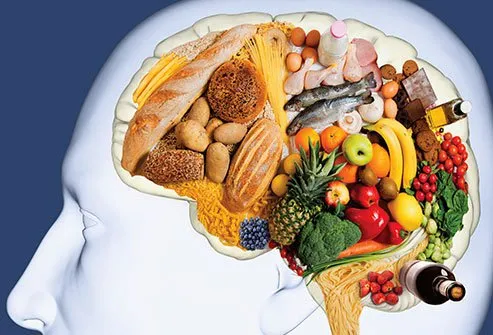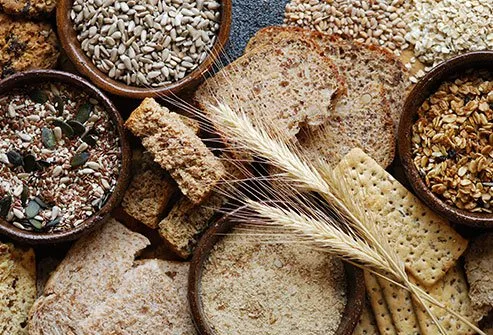How Might Your Diet Affect Your Brain?

We like to think of our brains as something set apart from our bodies. Biologically though, the way you feed your body affects your brain as well. The brain requires certain nutrients to function smoothly, and when it consistently doesn't get what it needs, this could add up to an increased risk of the various forms of dementia such as Alzheimer's disease. Even if the brain doesn't use a food directly, it benefits from a healthy circulatory system, and the best brain foods are also associated with cardiovascular health.
improve or harm our chances of acquiring or worsening dementia. This research is still being established, but evidence is beginning to line up in favor of certain foods, and against others. Certain diets have specifically been created with the aim of reducing your risk of dementia. We detail these brain diet plans and the latest research on the way nutrition may affect dementia risks.
What Is the MIND Diet?

Nutrition researchers at Rush University in Chicago designed the MIND diet to protect your brain. The diet also includes foods to stay away from for better brain health. The MIND diet is a blend of two popular diets: the DASH diet and the Mediterranean diet.
Studies are beginning to show that the MIND diet can protect the brain from dementia, though some research has been inconclusive. One major study showed that strict adherence to the MIND diet reduces dementia risk by up to 53% for people ages 58 to 98.
The Brain Food Groups of the MIND Diet

Taking a broad look at the foods we eat; the MIND diet breaks down the healthiest most healthy food types into 10 categories. The MIND diet food list also contains groups of five types of foods you should stay away from to protect your brain health. Along with these food groups, the diet suggests how much of each food should be consumed (or avoided). Read the following slides to see what foods may protect your mind and memory.
Beans

At least three servings per week.
How Does This Help Your Health?Beans are low-calorie, low-fat foods that also offer lots of healthy fiber and protein. They also have plenty of beneficial minerals such as iron and potassium. Good MIND diet bean recipes may include black beans and rice and chili. You can also add beans to soups and salads.
Leafy Green Vegetables

At least six servings per week.
How Does This Help Your Health?Leafy green vegetables provide plenty of nutrients, and they mean more than just salads. Bok choy, broccoli, mustard, spinach, and collard greens all fit this category. Leafy greens and brain health go hand in hand. These foods have already been proven to lower cancer risks if you eat two to three servings per week, and the MIND diet recommends double this number.
Berries

At least two servings per week.
How Does This Help Your Health?Berries promote brain health and they have neuroprotective advantages. The MIND diet particularly favors blueberries, which have been shown to benefit memory, learning, and other mental processes. The berries themselves have been shown in animal studies to protect aging brains, and studies have also shown that blueberry extract supplements show similar improvements. Besides blueberries, the MIND diet recommends strawberries, which are abundant with antioxidants.
Wine

One glass per day.
How Does This Help Your Health?Numerous studies have shown health benefits from low-to-moderate wine drinking, particularly when focusing on red wines. Wines have polyphenols that may be responsible for protecting your memory as you age. Wine boosts brain health and seems to aid in cognition regardless of dementia, and studies suggest it may lower stroke risks as well.
Olive Oil

Choose this for cooking.
How Does This Help Your Health?Virgin olive oil is abundant with phenols, which are aromatic compounds. The phenols found in olive oil have been associated with a wide range of healthy benefits. These include effects that are anti-inflammatory, anticancerous, and antimicrobial. They also seem to be good for protecting against Alzheimer's disease and other neural disorders such as Parkinson's disease and spinal cord injury.
Other Vegetables

At least one serving per day.
How Does This Help Your Health?Not every vegetable is leafy and green, but that doesn't mean you shouldn't make it a part of your diet. Other vegetables have special phytochemicals that serve as nutrients that may protect your body in special ways. That's why the MIND diet recommends one serving of these "other" vegetables each day. Eat more vegetables for brain power.
Nuts

Five servings per week.
How Does This Help Your Health?Studies on the nutritional benefits of nuts have shown memory improvements and potential protection from neurodegenerative declines like dementia. Walnuts have been singled out as a brain food. For example, they have been shown to protect against Alzheimer's disease. The reason seems to involve the healthy oils, vitamins, proteins, and soluble fibers these nuts bring to the table. The MIND diet recommends having several servings of nuts per week for brain health.
Whole Grains

Whole grains retain more of their plant-based nutrients than refined grains like white flour. Many of the nutritional benefits of other plants can be found in whole grains as well. It's also recommended by both the DASH and Mediterranean diet, which have both been shown to improve your odds against dementia. Have three or more servings per day of whole grains for brain health.
Fish

Once per week.
How Does This Help Your Health?Fish, especially fatty fishes like tuna, are full of healthy omega-3 fats. That's one reason fish has often been touted as a brain food, and it is a huge part of the Mediterranean diet, which recommends you eat fish every day. The MIND diet is a little more relaxed on this point. As long as you have one fish meal per week you should be getting enough according to this diet.
Poultry

Twice per week.
How Does This Help Your Health?Another way to maintain your cognitive health is by choosing white meat over red meat. Poultry is one of the most common types of white meat. Poultry includes turkey and chicken, and two servings each week or more are considered good choices on the MIND diet.
Foods to Limit: Red Meat

Fewer than four servings per week.
Why Should You Avoid It?What’s the link between red meat and brain health? While Alzheimer's disease rates are rising worldwide, it's rising more slowly in countries that eat little red meat such as Japan and India. One recent study combed over the medical literature and performed a new study to look into this association. They found that eating less red meat could be the best diet change for avoiding Alzheimer's, a form of dementia.
Margarine and Butter

Less than a tablespoon per day.
Why Should You Avoid It?Butter is high in saturated fat, and that raises your levels of bad cholesterol (LDL). But margarine is a little more complicated. Stick margarine is loaded with trans fats, which are considered worse for your heart health than saturated fats. And remember--the foods that are good for your heart seem to also have neuroprotective benefits. Some of the spreadable margarine alternatives may take less of a toll on your health, but the MIND diet recommends olive oil as your fat of choice.
Cheese

Less than one serving per week.
Why Should You Avoid It?In general terms, avoiding saturated fats is helpful in maintaining a healthy diet. Cheese seems to be healthier for your heart than other foods with saturated fats, but the standard Western diets has far too much cheese to be healthy. Try to remember that before you order your next pizza.
Sweets

Fewer than four servings per week.
Why Should You Avoid It?Does sugar affect brain function? A major study of Alzheimer's disease (AD) patients showed that their brains were less effective than normal at regulating glucose, and found that glucose and other sugars like fructose were found in higher levels in their brains than normal. Some experts now refer to AD as "Type 3 diabetes" because just like diabetes, AD contributes to insulin resistance. So just as people with diabetes are recommended to refrain from sugar and sweets, more doctors are giving the same recommendations to their AD patients.
Fried Food and Fast Food

Fewer than one serving per week.
Why Should You Avoid It?Does fried food give you brain fog? Fatty fried foods and fast foods have been linked with cognitive decline. When foods are fried, they let off oxidant glycotoxins, more commonly referred to as AGEs. These chemicals were found to predispose lab rats to Alzheimer's disease. AGEs can be found in almost any food, but they are found at very high levels in fast food and fried food.
Brain Health: Foods that May Lower Dementia Risk
This tool does not provide medical advice. See additional information: 
© 1996-2024 WebMD, LLC. All rights reserved.
